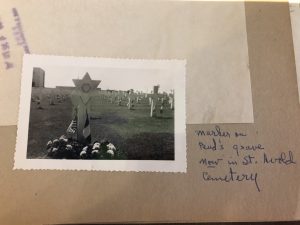By Susanna Sigler, MHS Library Assistant
In a blog post last week, we met Robert E. Siegel, a young man from the Boston area who was killed in combat during WWII. In this post, we’ll take a closer look at the words of condolence from the Siegels’ many friends, family members, and colleagues, as well as those who knew Robert.
As a couple with wide personal and professional circles, there are letters in the collection from noted attorneys, politicians, and artists. Several, I would discover in my research, have Wikipedia pages, such as lawyer and activist Alfred Baker Lewis, minister John Haynes Holmes, and De Hirsh Margules, artist and husband of Hannah’s sister Blanche. But beyond these names, what pervades here is grief, the helplessness that anyone would feel trying to write to friends who have lost their only child and were unable to bury him. One gets the sense from these letters that the Siegels are people who often help others but do not often in return ask for people to lean on. Their friends are more than willing to offer that support.

Beside this grief rests the impression that Robert made on those who knew him. There are letters from young neighborhood friends of Robert’s and family friends who knew Robert since he was an infant. There is a short correspondence between Hannah and Bernice, accompanied by photographs of Robert and Bernice together, looking every bit the teenagers that they were.
One of the most affecting notes, in a collection full of them, is from Guy Sabaté, a French pen pal of Robert’s. It seems like Robert had spent some time in France when he was younger, and had been writing to Guy since before the war.
Now liberated from German occupation, Guy says that they can now write freely. “I spoke to USA boys,” he writes, speaking of American soldiers, “and we understand together too well.” He says he hopes this letter will reach Robert.

Perhaps most heartbreaking is the letter from Benjamin Siegel to his wife, in which he talks about his own memories of the end of WWI and his hope that someday they may adopt a child. It was at this point, dear readers, that I was fully crying in the reading room.

In working with this collection, I find myself feeling that I am intruding on a family in their most private moments. But I see too that Hannah London so deeply wanted her son remembered that she carefully assembled these scrapbooks and gave them to the Society for care and preservation. I feel very privileged to be a part of that in this small way.

The Robert E. Siegel Papers can be viewed at the Massachusetts Historical Society.
Robert’s letters and the papers of Hannah Ruth London are located at the American Jewish Historical Society in Manhattan.

